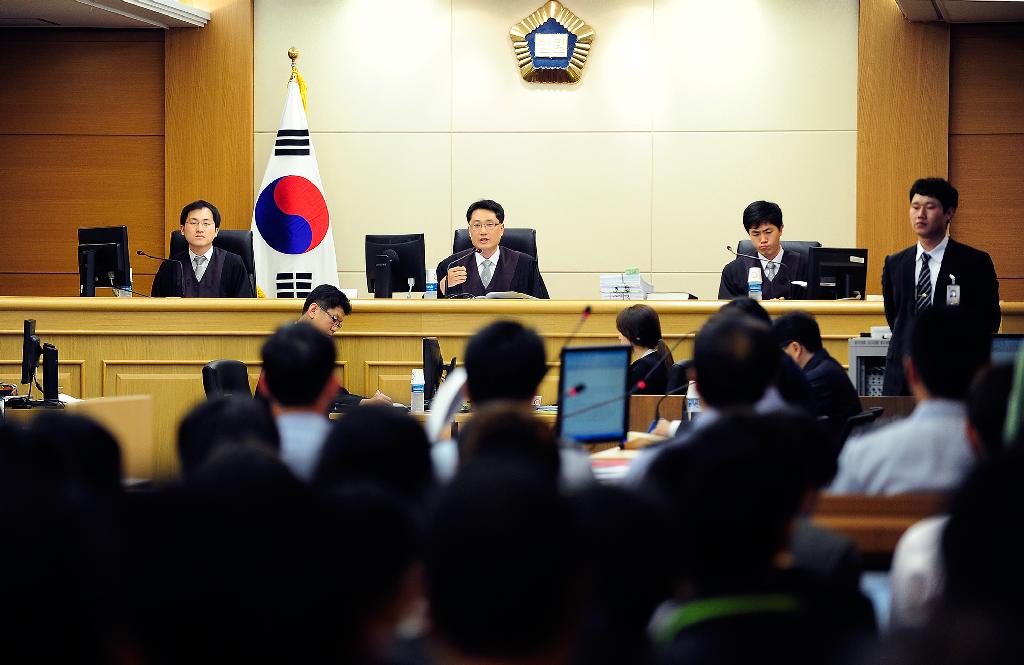
CASE CLOSED: SOUTH KOREA AWAITS IMPEACHMENT DECISION

Hearings in President Park Geun-hye’s impeachment trial draw to a close on Monday.
Park’s lawyers have attempted to slow the court process in recent months after the chief justice retired in January. If the decision is pushed past March 13 – when the acting chief justice will also retire – the embattled Ms Park will be afforded more time at the helm, and possibly even escape scot-free. The court has caught onto this tactic and had told Ms Park to stop stalling.
Ultimately, analysts say the court is unlikely to go against broader public sentiment, with two-thirds of those polled believing President Park should be removed from office.
However, some legal experts have highlighted technical irregularities with December’s impeachment vote. In particular, they say parliament failed to consider the 13 grounds for impeachment separately, and also question whether the nature of the allegations are sufficient to warrant impeachment.
After wrapping up hearings on Monday, the court will have until June to reach a decision, although the retirement of key judges is likely to expedite the process. If President Park’s impeachment is upheld, the country will hold fresh elections within 60 days.
Go deeper: Political turmoil on the Korean peninsula
TREES TO GO, BUT RUSSIA JUST A TAP AWAY

Despite delays in Italy’s Puglia region caused by more than 200 ancient olive trees, decision makers have confirmed that the Trans Adriatic Pipeline (TAP) will be fully operational by 2020.
Once completed, the line will pipe gas from oil fields in the Caspian Sea to the European Union. TAP is one pillar of the Southern Gas Corridor – an integral part of the EU’s strategy to diversify the origin of its gas imports and thereby reduce its reliance on Russia.
Moscow currently provides around 30% of the EU’s gas; in certain Central and Eastern European countries it is the sole supplier. Moscow hasn’t been shy about using its position of strength to ensure its interests are taken into account.
While Italy’s interior minister says work to move the historic trees will begin on Monday, another problem looms: the Kremlin wants to use the pipeline too. Russia is currently building a separate pipeline – the Turkstream – that will intersect TAP at the Turkish-Greek border. If granted access, this would render the EU’s diversification strategy futile.
SPLIT AND REFORM: ITALIAN ELECTIONS

Italian lawmakers will begin debating reforms to the country’s electoral law on Monday. The reforms are mandatory; in January the Constitutional Court invalidated parts of the current legislation, which was passed under the former government of Matteo Renzi in 2015.
While the technicalities of the proposed reforms – centred on scrapping the second-round voting procedure – are mundane and relatively inconsequential, the timeline of the reform process is crucial.
The recent dogfight between Mr Renzi and a former faction of the ruling Democratic Party – which split to form its own left-wing party last week – hinged on when to hold the next election. Renzi wants a vote held soon – possibly as early as June – while his opponents want to wait until the government’s term runs out in mid-2018.
For his part, Italy’s president opposes early elections and technically has the power to prevent them. But as a figurehead, there’s little he can do if Matteo Renzi can persuade enough of his fellow lawmakers.
Ultimately, however, Italians can’t head to the polls until a new and valid electoral law is passed, making Monday’s debate crucial. Mr Renzi will be pulling out all the stops to make this happen.
Go deeper: Italy’s referendum: a leader under pressure
HAPPENING ELSEWHERE…
The ‘Brexit bill’ moves to the committee stage of the UK’s upper house. Here it’s likely to face determined attempts to amend it, including from members of Theresa May’s own Conservative Party. The Party doesn’t hold a majority in the upper house, meaning that PM May will face pressure to accept changes to the bill to get it passed.
Armenia’s president travels to Brussels for talks with EU authorities. Meanwhile, tensions with long-time enemy Azerbaijan are on the rise again after a weekend of skirmishes left several Azeri soldiers dead in the disputed Nagorno-Karabakh region. This will be a flashpoint to watch in the coming weeks.
The US Senate is likely to approve Donald Trump’s pick for the Secretary of Commerce position, Wilbur Ross. The chamber will also consider Ryan Zinke, who’s been chosen to run the Interior Department.

